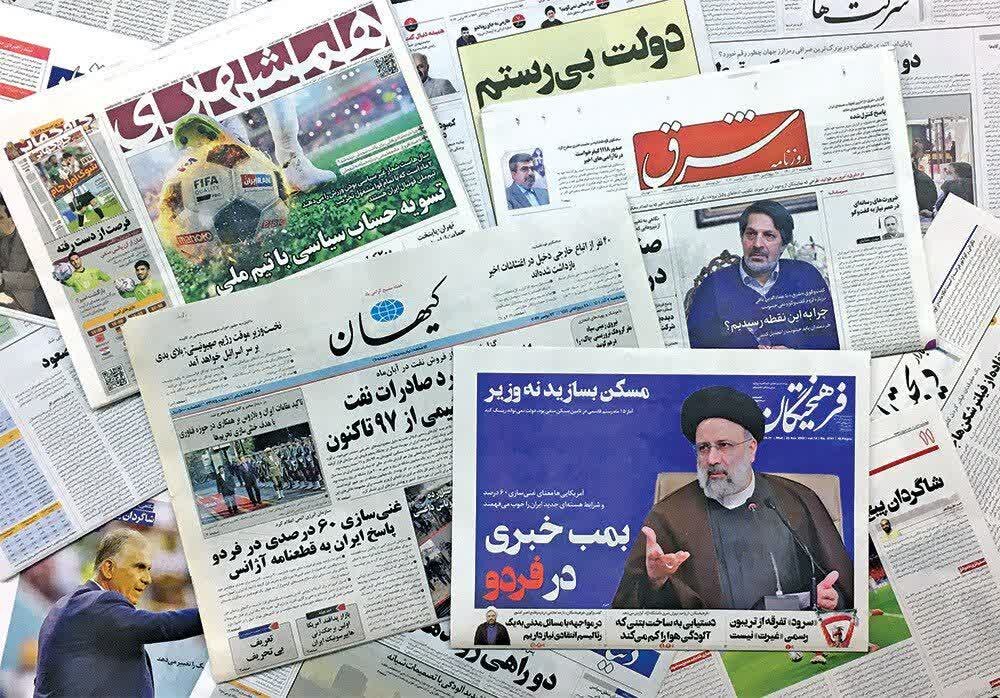Shock to Bibi

Netanyahu's policies against the Palestinians provoked a tough reaction from Saudi Arabia and the UAE, the Iran newspaper writes. While the two countries until recently had taken the lead in normalizing relations suddenly entered into a serious challenge with the Zionist regime.
While Saudi Arabia, as the host of the United Nations tourism program, had invited Israelis to participate in the event, it refused to grant visas to the delegation.
The UAE, which had normalized relations with the Zionist regime in the summer of 2020, surprised Israel by announcing that it has suspended the purchase of defense systems from the Zionist regime, which indicates that there is a serious crisis in the newly resumed relations between the UAE and the Zionist regime.
In addition to the concerns that it has declared about the Palestinians, Saudi Arabia also wants to advance its nuclear program by using Tel Aviv's interest in normalizing relations with Riyadh.
Arman-e-Melli: A new approach to int'l relations
In Iran, some have a deep view of the political developments in the international arena and came to the conclusion that they should change the country's direction towards convergence with the world and take a big step and struck an agreement to renew ties with Saudi Arabia, Arman-e-Melli writes.
The agreement with Saudi Arabia includes issues that are part of the concern of the international community, such as Yemen, Iraq, Syria, and Lebanon, and through the agreement with Saudi Arabia, Iran is on a path that is compatible with the world order in the eyes of Western countries.
On the other hand, the release or exchange of Iranian and American prisoners at this point shows that Iran is implementing a defined program and policy that includes de-escalation and alignment with the international community, and the Islamic Republic wants to move step by step in that direction.
If Iran’s moves win the confidence of the international community, then the negotiations for the new JCPOA will be formed. Because the JCPOA of 2015 no longer exists, and if it leads to the JCPOA, it will be a new one that will have its own conditions and must be compatible with the new conditions.
Sobh-e-No: Domino of relations between Iran and Arabs
Certain Arab countries that had cut ties with Iran in recent years are now seeking to restore their relations with Tehran a few days after an agreement between Iran and Saudi Arabia to renew ties, Sobh-e-No says in a commentary.
On Monday, the Minister of National Salvation of Yemen announced that the Saudi war in Yemen has ended and the UAE wants to improve relations with Yemen.
Anwar Gargash, the diplomatic adviser to the head of the UAE government, welcomed the warm relations between Tehran and Riyadh.
After the green light from Saudi Arabia, Manama is determined to resume relations with Tehran.
The consequences of the agreement between Iran and Saudi Arabia have extended to the Horn of Africa, that is, to Egypt. In a statement, the Egyptian Foreign Ministry expressed hope that the agreement would help reduce tension in the region, strengthen the pillars of stability and protect Arab security.
The Ministry of Foreign Affairs of Jordan also expressed hope that the agreement will help to strengthen security and stability in the region, maintain the sovereignty of countries, non-interference in the internal affairs of Arab countries, and maintain common interests.
Vatan-e-Emrooz: From Brzezinski's nuclear hoax to Burns' confession
Vatan-e-Emrooz writes in 2013, when the Obama administration was trying to sign the JCPOA, Zbigniew Brzezinski, the national security adviser in the Carter administration, highlighted an important point about Washington's hypocrisy.
He said: "Imagine that Iran has only one atomic bomb. Can it be used for retaliatory attacks without testing? Saying that Iran has nuclear bomb is trickery.”
About 2 weeks before Grossi's recent trip to Tehran, William Burns, the head of the CIA, also said: As far as we know, we believe that Iran has not yet made a decision about its nuclear weapons program.
Just when the head of the CIA considers Iran's nuclear activities as civilian, Rafael Grossi, the director general of the IAEA, visits Iran to verify claims of 84% enrichment in Iran.
The common denominator of Brzezinski's and William Burns' positions is the West's open deception regarding Iran's nuclear activities.
Kayhan: The table set by Iran; all but America
Six years after the U.S. president said that "Saudi Arabia is our milk cow", the New York Times wrote: "America was left behind in negotiations between Iran, China and Saudi Arabia."
Trump's words were offensive, but he was simply representing real America, Kayhan comments.
While Saudi Arabia has adopted the right policy, some pro-Western individuals in Iran insist that Tehran should resolve its differences with the United States and believe that an agreement with others is useless.
Over the past few months, the pro-Western figures repeatedly insisted on "negotiation with the United States", while the American officials have emphasized: "Reviving the JCPOA has not been on the agenda for months."
If Iran had not stood up against America, NATO, and Israel after the collapse of the Soviet Union, the West would have dominated the region. In that case, China, Russia, India, and others had to get permission from America to buy a barrel of oil.
The important thing is the strategic blow to the undisputed dominance of America; even Saudi Arabia, which was America's ally, decides to distance itself from Washington.
Pro-western circles in Iran do not want to accept that developments are beyond the control of the U.S.; they must accept that great successes have been achieved without JCPOA and FATF.
Leave a Comment